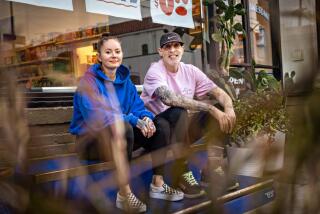Farmer uses the old bean
- Share via
Reporting from Turlock, Calif.
Joe Fagundes, a 66-year-old Central Valley dairy cow broker, likes to joke around.
For four decades he has carried a photo of a most unfortunate-looking woman in his wallet, gleefully showing it to strangers as his “beautiful wife” or “lovely daughter.” He makes city kids whip around by shouting “Hey, look at that blue cow!” And Fagundes was just joshing when he invented International Fava Bean Day.
The latter is a joke gone right. His yarn grew faster than Jack’s famous beanstalk (which food scholars believe was most likely inspired by fava beans). Now going on its 17th year, Fava Bean Day draws hundreds to the Stanislaus County Fairgrounds to raise money for children with cancer.
On Saturday, volunteers will cook 500 pounds of fresh-picked favas in an 80-gallon cast iron pot on a burner improvised from a John Deere exhaust pipe. Dinner is free to whoever shows up. An auction of donated items ranging from butter to bird houses to cows — to a classic muscle car — will raise cash. The money goes to the recipients’ families to spend as they see fit.
Fava organizers find the families just by keeping an ear to the ground. There’s always someone, like a nephew or a classmate of someone’s child.
“Everybody’s been touched by cancer. It’s a dirty, rotten thing,” Fagundes said.
Until he invented Fava Bean Day, Fagundes didn’t know much about the buttery beans except that he liked to eat them. Now he’s a font of facts.
“They found them with the pharaohs,” he said. “Guess we brought them back from the grave.”
He doesn’t make any cracks about liver and a nice Chianti, because he says he’s never heard of Hannibal Lecter, the fictional cannibal who favored a fava bean side dish.
“Hey, Mary Jane,” he hollers down a table of people shucking favas for Saturday’s event. “Have you ever heard of a movie called ‘The Silence of the Lands?’ ”
Like many people in California’s dairy country, Fagundes is of Azorean descent. There are more people from the Azores (nine Portuguese islands in the middle of the Atlantic Ocean) living here than in the Azores.
You can often tell a Portuguese house because it has fava beans growing outside the door.
“We love our favas,” Fagundes said, pronouncing it “favash” with the trademark Portuguese “shh.”
One spring when the fava beans by Fagundes’ door were just right, their pods bumpy with beans, he picked a bunch and went to the tractor shop on his property to cook them for the men working that day.
Soon he had persuaded them that it was International Fava Bean Day, “a huge deal In Portugal, Brazil, Goa, Azores ... all the Portuguese places,” he told them, the scent of garlic, cumin and linguica, a spicy Portuguese sausage, filling the air.
They all had a laugh, and revived the joke a year later. The year after that, they really had a fava party, and about 200 people showed up.
Someone suggested they make it a yearly event and political fundraiser.
“No way,” Fagundes recalled saying. “If we’re going to make it a fundraiser we’re going to make it for something good.”
He jumped up in the bed of a pickup truck and asked the crowd if they wanted to raise money for children with cancer.
“It was a roar, like those old movies where the crowd goes ‘huzzah!’ ” Fagundes said.
Over the years, the event has raised $147,824. It moved from Fagundes’ yard to the fairgrounds and draws about 500 people. Last year, however, brought in half as much money as usual. Organizers figure this year will be worse. Times are tough in dairy country. Milk prices are down and feed prices are up. Families can’t pay their bills or donate a cow to auction.
There were to be three Fava Bean Day recipients. There were already two, but Fagundes’s daughter Yvette Fagundes-Hall, a teacher, heard of another family.
The organizing committee decided there was nothing to do but raise what they could and split it three ways.
When Fagundes-Hall called the family to tell them they had been chosen, she learned the 7-year-old boy had died that day.
Fagundes doesn’t bother to wipe away his tears as he tells the story.
“Breaks my heart, these kind of things,” he said. “We’ve lost a few of our kids over the years. But sometimes you see one who’s all better and grown up at the hardware store or something and it makes you real happy.”
Bailey Rocha, who died of leukemia at the age of 8, was the fava recipient in 2004 when she was 5. Her family used some of the fava money to buy her an iPod so she could listen to music during her treatments.
“Bailey loved Fava Day. That was party time for her,” said her grandmother Dellayne Rocha. “Everybody together. A laugh a minute.”
Now, sure as spring brings fava beans, it brings the Rochas, almond growers in nearby Newman, to Fava Bean Day.
“The cancer kids are there running around and your heart breaks inside a little,” Rocha said. “But there’s laughter and a free feed and sharing. It’s hard to explain, but it honors the whole roller coaster of joy and sorrow. Dairy country is hurting right now but I think Fava Bean Day helps us all get through a bad time.”
More to Read
Sign up for The Wild
We’ll help you find the best places to hike, bike and run, as well as the perfect silent spots for meditation and yoga.
You may occasionally receive promotional content from the Los Angeles Times.







